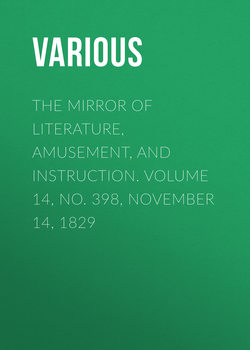The Mirror of Literature, Amusement, and Instruction. Volume 14, No. 398, November 14, 1829

Реклама. ООО «ЛитРес», ИНН: 7719571260.
Оглавление
Various. The Mirror of Literature, Amusement, and Instruction. Volume 14, No. 398, November 14, 1829
THE NATURALIST
1. THE PRAYING MANTIS
2. BRANCHED STARFISH
CATS
TO MISS MITFORD,
RETROSPECTIVE GLEANINGS
TOUCHING FOR THE CURE OF THE KING'S EVIL
ADMINISTRATION OF JUSTICE AMONG THE EGYPTIANS
THE TOPOGRAPHER
CLIFTON HOT WELLS
MANNERS & CUSTOMS OF ALL NATIONS
THE GERMANS AND GERMANY
SPIRIT OF DISCOVERY
GEOGRAPHICAL
SPIRIT OF THE PUBLIC JOURNALS
A SINGULAR LETTER FROM SOUTHERN AFRICA
THE GATHERER
BEFORE AND AFTER DINNER
BELLS
BLUNDERS
A JINGLING POET
SONG
Отрывок из книги
Castles, cathedrals, and churches, palaces, and parks, and architectural subjects generally, have occupied so many frontispiece pages of our recent numbers, that we have been induced to select the annexed cuts as a pleasant relief to this artificial monotony. They are Curiosities of Nature; and, in truth, more interesting than the proudest work of men's hands. Their economy is much more surprising than the most sumptuous production of art; and the intricacy and subtlety of its processes throw into the shade all the contrivances of social man: a few inquiries into their structure and habits will therefore prove entertaining to all classes of readers.
It mostly goes on four legs, holding up two shorter ones. The hind legs are very long; the middle ones shorter. It is sometimes called the Dried and Walking Leaf, from the resemblance of its wing covering, in form and colour to a dry willow leaf; it is found in China and South America, and in the latter country many of the Indians believe that Mantes grow on trees like leaves, and that having arrived at maturity, they loosen themselves, and crawl or fly away.
.....
Its real disposition is, however, very far from peaceable: it preys with great rapacity on smaller insects, for which it lies in wait, in the first mentioned posture, till it siezes them with a sudden spring, and devours them. It is, in fact, of a very ferocious nature; and when kept with another of its own species, in a state of captivity, will attack its fellow with the utmost violence, and persevere till it has killed its antagonist. Roësal, a naturalist, who kept some of these insects, observes, that in their mutual conflicts, their manoeuvres very much resemble those of hussars fighting with sabres; and sometimes the one cleaves the other through, or severs the head from its body with a single stroke. During these engagements the wings are generally expanded, and when the battle is over, the conqueror devours his vanquished foe.
The last mentioned species is the supposed idol of the Hottentots; the person on whom the adored insect happens to light, being considered as favoured by the distinction of a celestial visitant, and regarded ever after as a saint.
.....